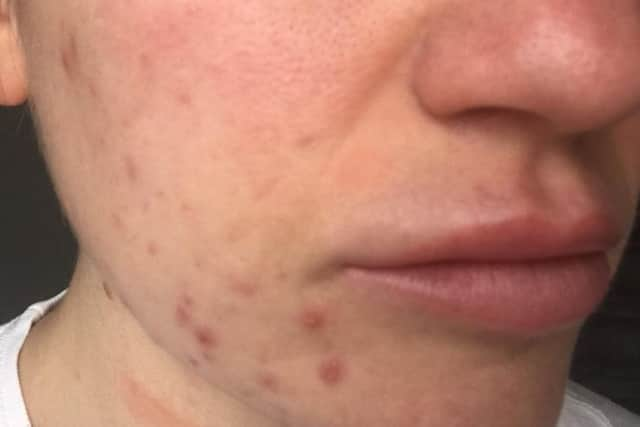Yorkshire woman, 30, discovered yeast allergy was causing her mouth sores and cystitis


Emily Dobbie, 30, from Thackley near Bradford, began suffering from acne as a teenager but her condition gradually worsened.
She would endure debilitating bouts of the bladder infection cystitis and would have scab-like sores on her mouth and eyelids, red, patchy skin on her face and yellow and green spots.
Advertisement
Hide AdAdvertisement
Hide AdThe beautician, who runs Leeds city centre salon Gateway to Beauty, had no idea what the cause of the flare-ups could be.


Last summer, she was on holiday in Italy with her partner when her skin became so bad that she had to hide behind a large hat and sunglasses.
She became too embarrassed to leave the house, but unexpectedly found answers to her health issues when she saw a social media post by reality TV star Megan McKenna, who had taken a food intolerance test and seen dramatic changes to her digestive health.
Advertisement
Hide AdAdvertisement
Hide AdEmily arranged for similar tests and has now discovered she is allergic to yeast and milk, as well as coffee and some nuts.
The diagnosis explains why her skin would worsen after she had eaten baked goods, processed meats and even condiments.
Her complexion cleared up in a matter of days and she is now much healthier.
“For the first time in years, I actually feel happy about the way I look," said Emily.
Advertisement
Hide AdAdvertisement
Hide Ad“As a beautician, it’s my job to make people feel good about the way they look. But I was often unhappy with what I saw in the mirror.
“I used to cover my face with concealer to hide the blotches. But now I can go make-up free - and my skin generally just looks less ‘dull’ than it used to.
“Living in fear of cystitis for so long was also just debilitating. I never felt like I had control of my own body.
Advertisement
Hide AdAdvertisement
Hide Ad“I know I need to be super-strict and careful about what I eat from now on because the last thing I want is for these horrible symptoms to return.
“But I’ve lost weight, I’m 100 per cent more confident than I used to be and I’ve also got more energy. I wish I had explored my food intolerances years ago.
“On the first day of the trip to Italy, my eyes were really sore underneath and the skin bright red.
“I thought I maybe had hayfever. But when I woke up the next day it was even worse.
Advertisement
Hide AdAdvertisement
Hide Ad“I tried to cover it with concealer but the rash spread to my cheeks. Again, I thought it was a reaction to the sun.
“But by the time we came to fly home, I had to wear a hat and sunglasses because my face was just a red, blotchy mess.”
“My face was awful and had awful cystitis. I went from drinking two litres of water to four litres of water in the morning to get it to clear up, but nothing helped.
“I didn’t want to leave the house. I had scabs all over my face and felt horrible. I’m usually quite a chatty person but I was so low I didn’t want to see anyone. I was not in a good place mentally.”
Advertisement
Hide AdAdvertisement
Hide AdEmily had initially been denied allergy testing by her GP, so paid for private tests at York Test Laboratories instead.
Through a finger-prick blood analysis, they were able to measure which foods triggered potentially negative reactions.
“I can tell when I’ve had something I shouldn’t because the skin around my eyes immediately gets dry.”
The lab's scientific director Dr Gill Hart said:
“When food particles enter the bloodstream, the immune system can sometimes identify these food protein particles as foreign and produces what’s known as ‘IgG antibodies’ to attack the food in question.
Advertisement
Hide AdAdvertisement
Hide Ad"This response is your immune system’s natural defence mechanism to ward off harmful invaders in the body which can create inflammation.
"So, essentially, these IgG reactions go hand in hand with gut imbalances and inflammation and are released in the presence of certain ‘trigger’ foods.
"And by analysing your IgG antibodies to up to 208 food and drink ingredients, including wheat and gluten, we can advise people on what they might wish to cut from their diet.
“We’re delighted Emily has had such a positive result and we’d urge others with concerns to take a closer look at their own diets.”